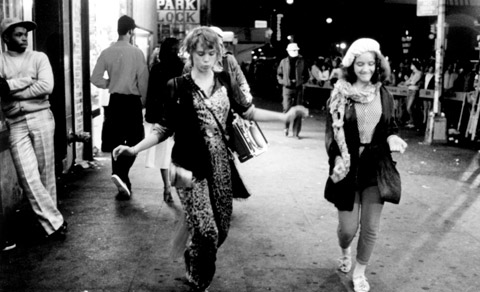
CHEAP THRILLS Times Square is one of the films in the Harvard Film Archive series capturing the punk sound, scene, and DIY aesthetic. |
"We are going to do everything ourselves, because we know better than them what we want," explains teenage grrrl-punk Nicky Marotta to a politician's shy daughter, Pamela Pearl, in the seminal 1980 punk film Times Square. The two are on a subway to gritty pre-Giuliani Midtown Manhattan after meeting in a psychiatric clinic, breaking out, and running away together, eventually starting punk band the Sleez Sisters.
In one line, the rebellious lead summarizes not only the duo's anti-establishment goals, but the ethos driving '70s punk culture entirely: the fuck-it-all music, sliced-and-pinned clothes, self-published literature, and — as the Harvard Film Archive's upcoming "American Punk" series shows — DIY, homemade cinema.
Launching September 2, the series incorporates a range of budgets, genres, and iconoclastic voices, encompassing everything from Hollywood features (like Times Square and punk-rock zombie flick Return of the Living Dead) to rarer films from the '70s and '80s NYC and Los Angeles punk undergrounds — films that broke new ground for the super-punk concept of filming econo. It culminates on September 26 with a series of nine shorts in 85 minutes, "Radical Light: Alternative Film and Video in the San Francisco Bay Area," a portion of a larger program curated by the Pacific Film Archives. Other sections of “Radical Light” screen on September 24 and 28 at ArtsEmerson and MassArt, respectively.
The past year has seen a resurgence of interest in such anarchic pictures, with the April release of Blank City, documenting the 1970s No Wave scene in New York, and the October 2010 publication of the genre's first guidebook, Destroy All Movies!!! The Complete Guide to Punks on Film. HFA Programmer David Pendleton, who co-curated the series with conservator Liz Coffey, says that although punk films have always been influential, this series comes with a particular sense of urgency. "Looking back to the late '70s makes a certain amount of sense," Pendleton says, "given the economic difficulties of that time and how it fueled unrest and artistic innovation."
A broader picture of early coastal punk scenes is painted by documentaries. The New York–set The Blank Generation is a 1976 home-movie doc made by speed-induced Amos Poe and musician Ivan Kral, featuring live CBGB footage of Patti Smith, the Ramones, Television, and Talking Heads. The West Coast is covered by Penelope Spheeris's The Decline of Western Civilization, with footage of Black Flag, Circle Jerks, and the Germs, plus interviews exposing the most underground of '80s Hollywood's scuzzy clubs and apartments.
Fictional-narrative films are aggressively anti-conventional; highlights include No Skin Off My Ass (1991), Desperate Teenage Lovedolls (1984), and Suburbia — Spheeris's 1983 take on the scene documented in Decline. The black-and-white 16mm Skin, directed by Bruce LaBruce, follows the budding relationship and sexual encounters of two queer punks who meet in a park; it "responds to machismo within punk and complacency within gay male culture," explains Pendleton.